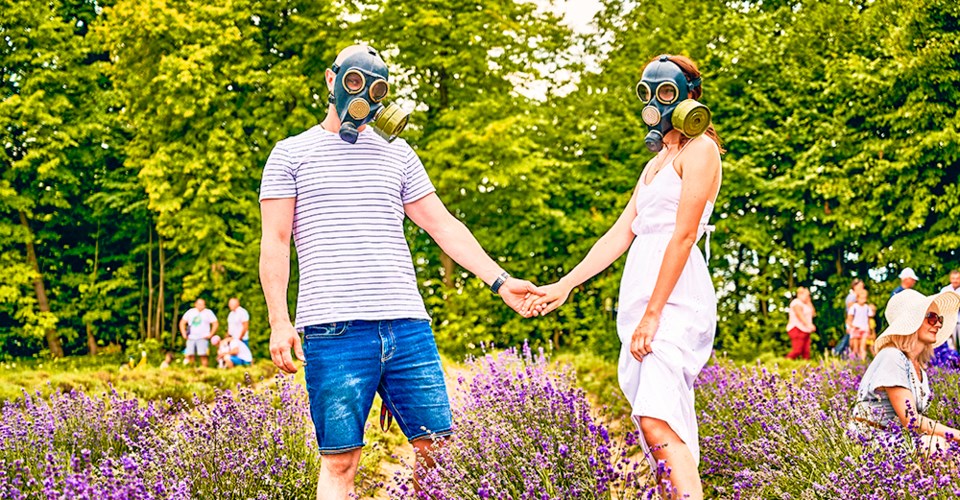Another thing to thank climate change for—longer lasting allergies
Sneezing more this spring than usual? Long dormant allergies kicking up? You’re not alone. Anecdotally, the Voice has heard from a number of readers that this year has them sniffling more than last—and taking the long-term view they’re right.
We can anticipate more widespread allergy seasons in the coming years, as evidence shows that climate change is driving temperature upwards, which is linked to pollen increases from trees, grass, and weeds.
Common symptoms of seasonal allergies include sneezing, runny nose, cough from post-nasal drip and nasal congestion — all of which overlap with symptoms of Covid-19, which can be instill a sense of panic in some people.
Global News reported that scientists found a 21 percent increase in pollen concentrations over the last three decades while studying some 800 sites across North America. The combination of higher temperatures, allowing plants to bloom earlier and later, and higher carbon dioxide levels that cause more pollen production, is the driving force behind why allergy seasons are getting worse.
In Ontario, tree or birch pollen season typically starts in late April and lasts for several weeks, while grass pollen season starts in May. Ragweed season typically starts in August, and runs until the first frost in the fall.
There are also economic consequences to heightened allergic conditions, as more Canadians take sick leave, costing businesses millions of dollars in productivity losses.
Niagara Health’s Chief Medical Officer, Dr. Mustafa Hirji, told the Voice that the main surveillance system for air quality in Canada is the AQHI run through Environment Canada.
“The rating for St. Catharines—which is intended to be the Niagara-wide rating—can be consulted for a sense of air contaminants that could be harmful to those suffering from underlying asthma or lung diseases,” said Hirji. “It is less a direct indicator for allergens, however. We therefore don’t have data to assess whether allergens are worse this year or not.”
The AQHI website can be found at https://weather.gc.ca/airquality/pages/onaq-015_e.html.
Another pollen index can be found at https://www.theweathernetwork.com/en/city/ca/ontario/niagara/pollen.
The good news is that the latest generation of non-drowsy antihistamines are long-lasting and won’t keep you awake at night.
Dr. Adam MacNeil, a professor in Applied Health Science at Brock University, leads an inflammation and immunity lab with a focus on trying to understand the molecular mechanisms that underpin allergic symptoms. His research team investigates novel approaches toward understanding and blocking allergic inflammation caused by chronic pathologies, including asthma, hives, rhinitis, and food allergies.
“I think that there are multiple things going on here in Niagara, which is obviously a rich agricultural region, where we have a massive diversity of different types of flowering plants,” said MacNeil. “There does seem to be a long-term trajectory that includes an increase in the allergic burden, and certainly Niagara is likely going to be among those areas on the leading edge.”
MacNeil said that there is a spectrum of over-the-counter decongestants and corticosteroids that can be used successfully in tandem with antihistamines.
“My lab focuses very much on mast cells, which are immune cells located under your skin, in your lungs and oral cavities, and your digestive tract,” he said. “These are immune sentinels, essentially, that target the particular immune mechanism that drives mast cell secretions that give you those allergic symptoms. In worst-case scenarios, we’re talking about things like peanut allergies that prompt severe cases of anaphylactic allergic reactions, requiring epinephrine shots that can help save people's lives.”
We definitely have seen some new Niagara residents experiencing allergy symptoms that they may not have experienced in other areas of the province or country
Those who have significant allergic reactions should always ask their physician to refer them to a clinical allergist to receive good guidance as to what might be the ideal medication, said MacNeil.
Glen Sisak and Zenia Winnicki, at Fonthill’s PharmaChoice pharmacy, consider 2022 to be a pretty average year thus far with regard to allergies.
“Perhaps allergy season is starting a bit earlier, which seems to be becoming the norm,” said Glen. “We definitely have seen some new Niagara residents experiencing allergy symptoms that they may not have experienced in other areas of the province or country. Fortunately, most people respond well to the newer antihistamines.”
Pharmacist Kyle Boggio agreed with Sisak’s assessment, and told the Voice that in his view, this allergy season appears to be fairly consistent with previous years.
“The best course of action, and the recommendation that I generally have for allergy sufferers, is to talk with their pharmacist when looking for an over-the-counter allergy medication. There are a variety of options, and some are more effective at treating certain symptoms and allergic reactions. Not all medications are appropriate for all people, so it is good to check with your pharmacist to ensure that your allergy meds are safe to take, in view of your personal medical condition and any other medications that have been prescribed.”
Allergy sufferers should try to avoid airborne allergens by closing doors and windows inside the home, using air conditioning, and avoiding the outdoors on dry, windy, and hot days. When working outdoors in the garden or cutting the lawn, it is also advisable to wear sunglasses and a hat, and perhaps a mask covering the nose and mouth. Clothes worn outdoors should be laundered promptly, and washing bedsheets regularly also helps.




